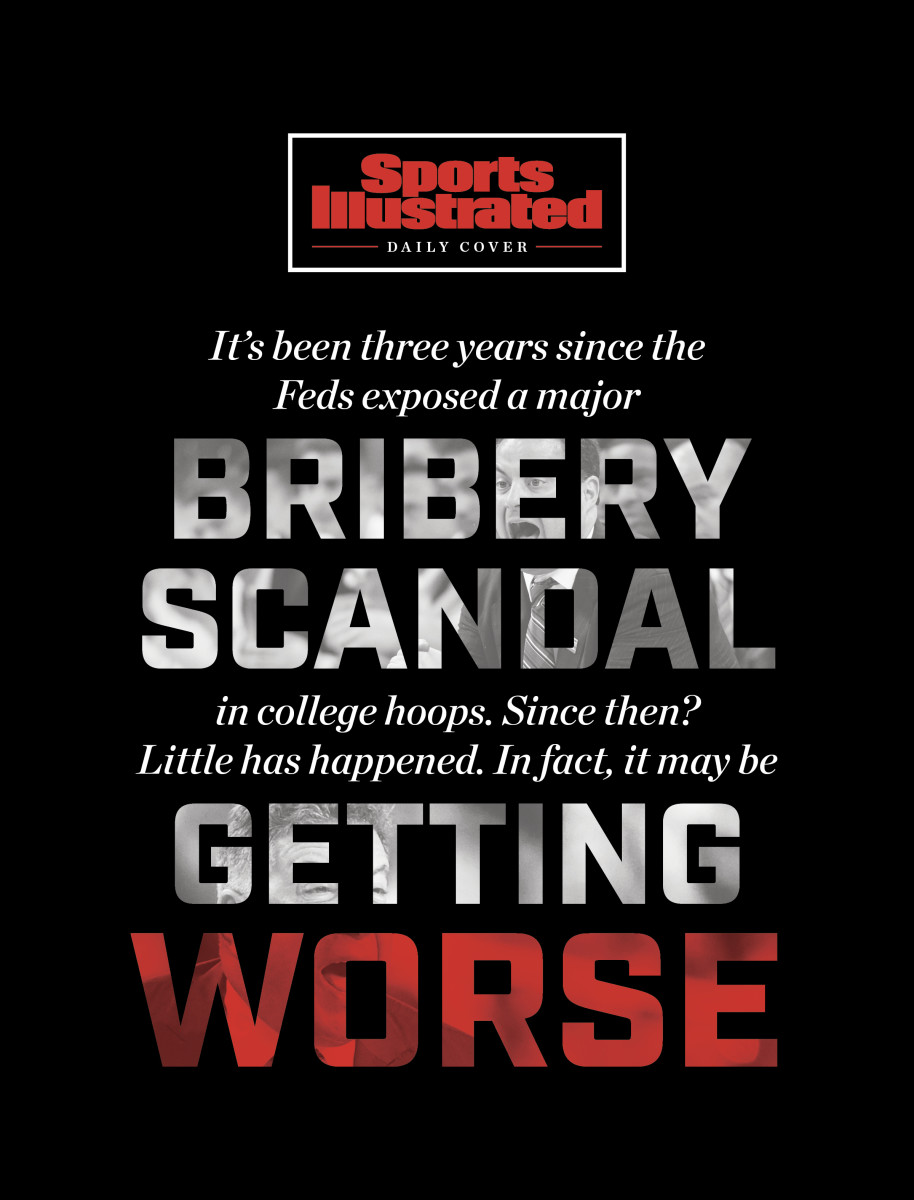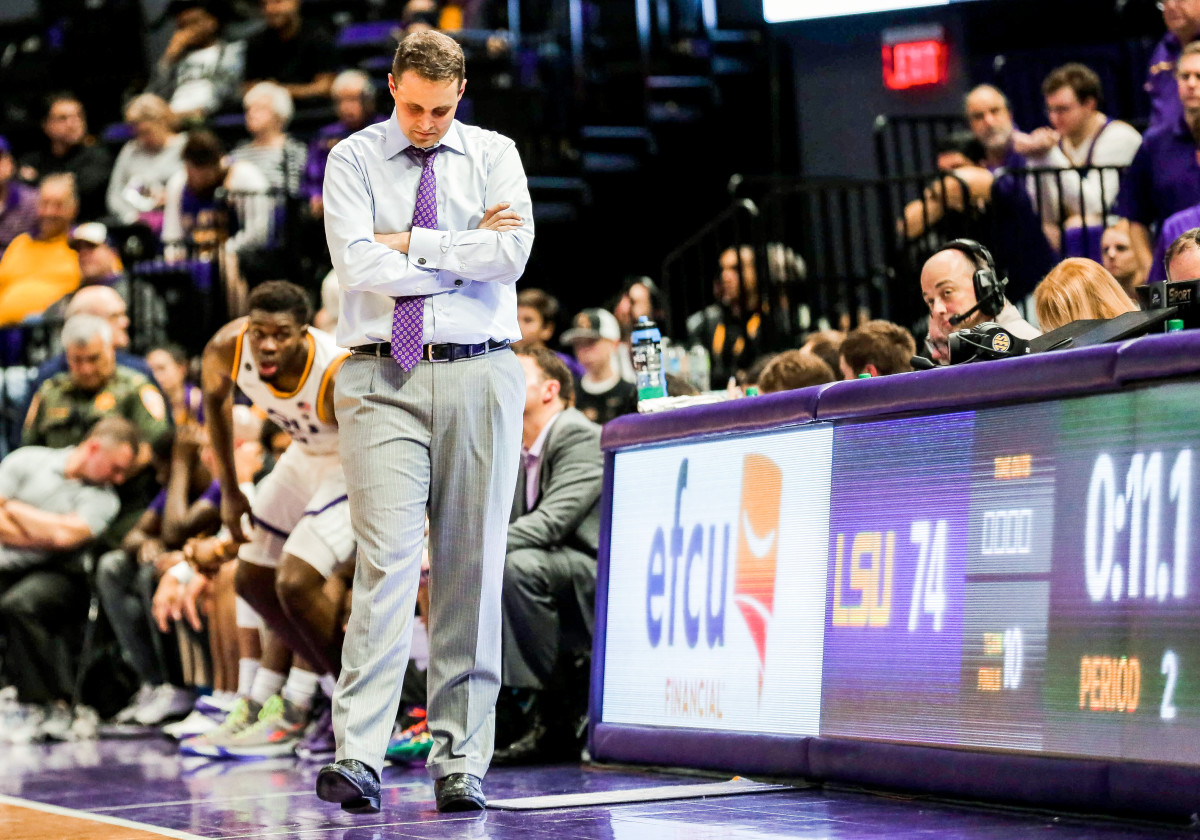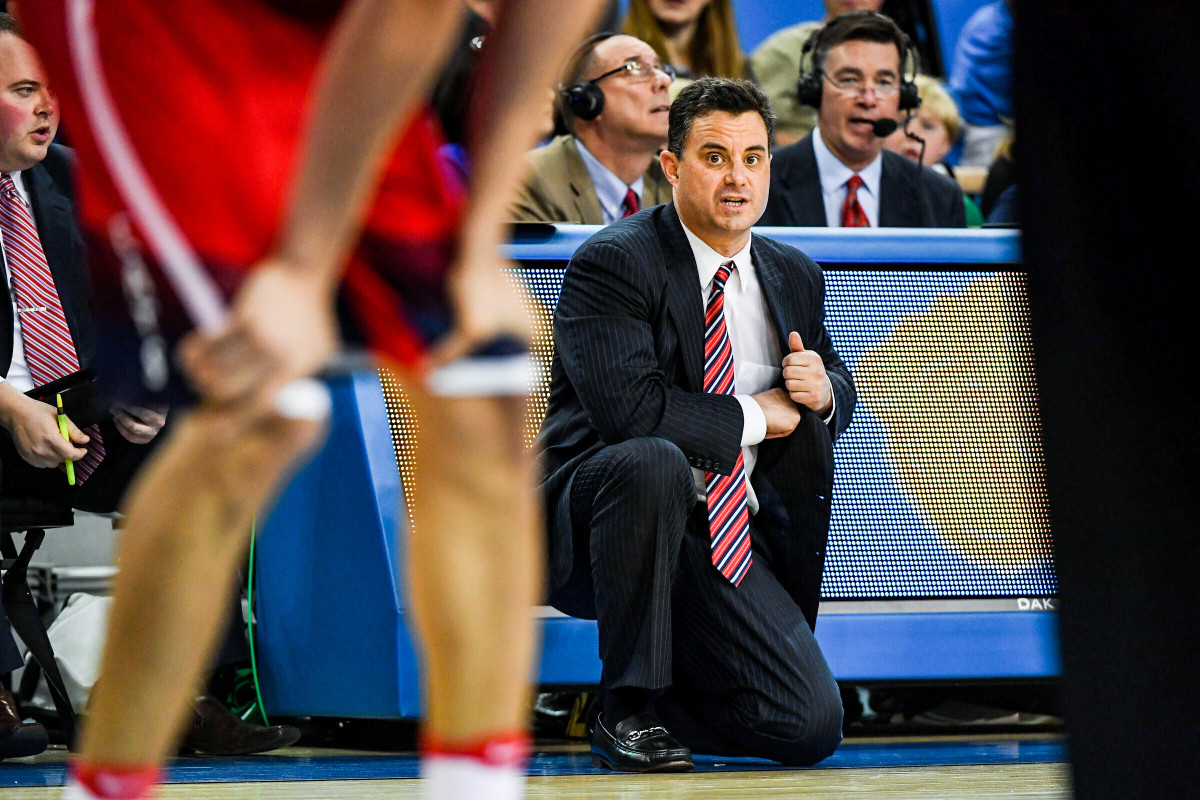Three Years Ago, the College Basketball Corruption Scandal Promised a Reckoning. Where Is It?
In May 2019, NCAA vice president of enforcement Jon Duncan walked into a ballroom at the Sandestin Hilton in Destin, Fla. Facing an audience of Southeastern Conference administrators and coaches at the league's annual spring meetings, Duncan repeated his mantra: "Our mission is to protect compliant schools."
At that point, it had been 20 months since federal investigators filed indictments against several college basketball coaches and insiders for their roles in a bribery scheme that exposed the sport's corrupt underground economy. At least a dozen Division I programs were implicated in the scandal, including four SEC programs—Auburn, LSU, Alabama and South Carolina. But on that spring day in 2019 when Duncan spoke to leaders of that conference, not much had happened yet from an NCAA investigative perspective. And since that day, another 16 1/2 months have passed without any tangible impact.

The NCAA enforcement staff's stated mission: not accomplished.
Only one program has gone through the investigative process and been penalized. That was Oklahoma State, which in June was hit with a 2021 postseason ban related to bribes accepted by former assistant coach Lamont Evans. There are at least 11 others tied up in the federal probe that are at various stages of the collegiate investigative process: North Carolina State, Kansas, TCU, Creighton, USC, Louisville, Arizona and the four SEC schools mentioned above.
Despite ongoing major infractions cases, three of those SEC schools have scored major recruiting coups this month: Auburn got a commitment from national top-five prospect Jabari Smith; LSU received a commitment from top-50 prospect Alex Fudge; and Alabama beat out Auburn and others for top-15 prospect J.D. Davison, one of several recent power moves by the Crimson Tide. Compliant schools are still losing out on the recruiting trail to schools that have not yet paid a price for alleged violations.
“I know what’s going on,” said South Carolina coach Frank Martin. “I know who’s doing what. If I was a prosecutor, I’d go after people. But I’m not. I’m a coach. So I stay away from certain situations when I know what’s going on. I’m not going to recruit against them.
“But if nothing is done, the message is that cheating is O.K. You can do what you want and nothing happens. There’s cheaters in every profession, but they’ve got to be dealt with. This [FBI investigation] was like an IRS audit. Our business was audited, and when something is audited, you find the problems and fix the problems. Our business has yet to fix the problems. It’s time to fish or cut bait.”
Six National Signing Days have come and gone since the scandal broke open. The seventh looms next month. And impatience with the continued employment of several accused coaches has reached a boiling point—nationally, yes, but perhaps most acutely within the SEC.
“Things may be worse now than they were before the FBI stuff.” —Anonymous industry insider
“I’ve been in this game so long, nothing surprises me,” said Tennessee’s Rick Barnes. “I don’t worry about what other people do. But what we all want, once something happens, let’s get to the bottom of it quick. That’s where the frustration is. We wish the process would go quicker.”
Auburn was involved in the federal investigation from the first day, after former assistant Chuck Person was charged with bribery. It was the second major infractions case on the watch of head coach Bruce Pearl, who was fired at Tennessee and given a three-year show-cause penalty in 2011 for lying to the NCAA about violations he committed. Auburn still has not yet acknowledged receipt of a Notice of Allegations from the NCAA, and athletic director Allen Greene declined to answer questions from Sports Illustrated about its ongoing case.
In 2019, it was reported that LSU’s head coach, Will Wade, was caught on an FBI wiretap discussing a "strong-ass offer" for a player with aspiring agent Christian Dawkins. The wiretap was then heard last spring on an HBO documentary about Dawkins, the central figure in the bribery scandal. Then, a July letter from Duncan to the NCAA Committee on Infractions said his staff received information that “Mr. Wade arranged for, offered and/or provided impermissible payments, including cash payments, to at least 11 men's basketball prospective student-athletes, their family members, individuals associated with the prospects and/or non-scholastic coaches in exchange for the prospects' enrollment at LSU.” SI also has received similar information regarding at least one recruit.

(The LSU infractions case has expanded to include football allegations, which the school is not disputing. An LSU booster pleaded guilty to wire fraud and money laundering charges and was sentenced to 33 months in prison for stealing more than half a million dollars from a hospital foundation. The booster funneled $180,000 of that to the father of an LSU player for a no-show job. Over the school’s objections, those violations have been bundled with the basketball case.)
Despite the baggage, Pearl has landed the highest-rated recruit of any SEC coach this fall, and Wade currently has the highest-rated SEC class for 2021. Those developments have spiked the temperature of some of their competitors.
“Auburn’s got to go down at some point,” said one SEC coach.
"I get sick to my stomach every time we play LSU," said an SEC administrator. "It's revolting when I see Will Wade walk into our gym."
The infractions cases involving Alabama and South Carolina are less complex and do not implicate anyone currently employed at either school, but they’re also without closure at this juncture. Alabama has been working with the NCAA regarding its case, which stems from former associate athletic director Kobie Baker’s involvement with helping Dawkins try to form a relationship with Alabama recruit Collin Sexton. South Carolina has received its Notice of Allegations and is charged with a Level I violation (the most severe) for former assistant coach Lamont Evans’s accepting bribes for arranging meetings between Dawkins and former Gamecock P.J. Dozier or his family. Evans was the involved party in Oklahoma State’s violation as well, and the expectation is that South Carolina also will be in line for a one-year postseason ban.
But as of now, there are no sanctions at South Carolina or Auburn, and no Notice of Allegations at Alabama or LSU. Against this backdrop, insiders say a conference rife with compliance issues is recruiting basketball players with impunity right now. While the feds might have scared some schools straight for a while, it hasn’t been a lasting change.
“Things may be worse now than they were before the FBI stuff,” said one industry insider with deep ties in both the recruiting and coaching realms. “It's like they receded after it initially hit, then nothing happened and now they're pushing the boundaries even further. The league is only getting worse.
“The SEC is a s--- fest right now, so coaches can’t be too hypocritical because everyone else is doing it, too. It’s pretty bad throughout.”
Multiple sources said league members have communicated their frustrations to commissioner Greg Sankey, who also wants the ongoing infractions cases in the league to be resolved. Sankey would not comment on individual cases when SI asked him about them in August, but he did emphasize that, in general, the process needs to move more quickly. “I think the commissioner is beyond the end of his rope,” said one league source. “He’s beside himself.”
Speaking generally and not just about the SEC, Duncan acknowledged that his investigators are still tracking plenty of potential infractions cases. “Sadly, violations continue,” he told SI. “I don’t know if it’s an uptick or a downturn, but I’m disappointed that we continue to receive actionable information from the membership.”
“People are robbing banks and you’re pulling over old ladies for going 40 in a 35” —SEC source on the NCAA
There are high crimes, and then there are misdemeanors. Both require the NCAA’s attention, which can slow down the investigative process. Within the SEC, multiple sources said Texas A&M is dealing with a basketball situation that will probably wind up on the misdemeanor side of the scale—impermissible workouts at a church gym during the NCAA-mandated COVID-19 shutdown period. While A&M's alleged violation would seem to be a willful act and not the result of an honest mistake, it's also not in the realm of six-figure cash transactions to acquire players.
The school’s compliance department discovered the workouts, according to sources, and A&M self-reported the violation. As a result of self-imposed sanctions, Buzz Williams’s program was not allowed to start workouts this fall for several weeks. Texas A&M athletic director Ross Bjork acknowledged the situation, but declined comment beyond saying that the school is dealing with it internally and appropriately. Whether the Aggies' self-imposed sanctions are accepted by the NCAA as sufficient, or this progresses further as an infractions case, is unclear. As is their policy, NCAA officials would neither confirm nor deny an investigation of A&M's men's basketball program.
Outside the SEC, Massachusetts was hit with sanctions last week for impermissible financial aid distributed to men’s basketball players and women’s tennis athletes. Among the penalties for what UMass said was an administrative error was the vacating of victories for both programs, including an Atlantic 10 championship in tennis. “The scope and depth of this minor administrative error does not compare with other institutions’ violations that truly jeopardize the collegiate model,” said A-10 commissioner Bernadette McGlade.
From time immemorial, situations like these have fed a belief that the NCAA majors in minors while allowing an underground economy to flourish. That might not be accurate, but the perception lingers in a league where programs under investigation keep landing recruits. “People are robbing banks and you’re pulling over old ladies for going 40 in a 35,” one SEC source said.
Fact is, the problems that existed before Sept. 26, 2017, still exist today. The feds, who engaged in a limited and cautious prosecution after their initial bluster, didn’t clean it up. The Condoleezza Rice–led commission on college basketball, which issued a report calling for substantive reform in the spring of 2018, didn’t clean it up. The NCAA hasn’t cleaned it up. Business goes on.
Said one Power 5 assistant coach from outside the league who has been recruiting against several schools implicated in the federal scandal: “They’re emboldened. They’re like Teflon dons, John Gotti. No head coaches have been suspended. Maybe they were embarrassed, but the paychecks are still coming.”
***

So, what’s taking so long?
How can Auburn, Arizona and USC have assistant coaches arrested in September 2017 and still not have any resolution to their NCAA cases? How can Louisville fire Rick Pitino in October 2017 and still not know its NCAA fate? How can Kansas be implicated very quickly in the federal scandal but still field a team favored to win the 2020 NCAA tournament before it was canceled? How can Arizona be deeply involved in the federal probe and still sign top-10 classes in 2019 and ’20? How can NC State receive the first notice of allegations of any school involved in the scandal, in July 2019, and still not have a ruling 15 months later?
The answer, like everything to do with the NCAA, is complicated.
Start with the association’s labyrinthine crime-and-punishment process, which under the best of circumstances requires about a year (often longer factoring in appeals) for an infractions case to start and finish. Add a stand-down investigative order from the federal government during its probe and subsequent trials, which kept NCAA investigators cooling their heels on some cases for about 18 months. Factor in a new “off-ramp” infractions element that brings in investigators and hearing officers from outside the NCAA membership. Multiple lawyers representing multiple coaches and schools in cases have been afflicted by serious illnesses—including one with COVID-19 and another with cancer—which has created further delays. Then throw a pandemic on top of that, which slowed down processes on campuses nationwide and also resulted in cost-cutting furloughs at the NCAA that have impacted Enforcement.
Those are all valid reasons, not excuses. But the bottom line is the same: an organization that was rightly bashed for taking forever to resolve the North Carolina academic scandal is still unable to resolve major cases in a matter of months instead of years.
“I’ve heard those same frustrations from coaches and member institutions,” Duncan said. “I understand those and share those. I’d like cases to move more quickly. … I know there are schools out there that feel disadvantaged, but we can’t sacrifice fairness and thoroughness.”
As Duncan pointed out, most college sports stakeholders are all for a speedy process—until it’s their school ensnared in a major infractions case. Then they want as much time as possible to respond to a notice of allegations, to prepare for a hearing, to file appeals, etc. Requests for extensions are commonplace.
Sometimes coaches or others under investigation are slow to respond to NCAA requests for information. Duncan’s previously mentioned July letter pertaining to LSU accused Wade of taking more than a year to adequately comply with a request for phone records. (Wade’s attorney disputed that timeline.)

One element that has impacted multiple cases: the new Independent Accountability Resolution Process, known as the “off-ramp” from the customary NCAA peer review procedure. That process takes investigations and hearings out of the hands of people affiliated with either the NCAA or its member schools and puts it in the hands of experienced judges, lawyers, investigators and others.
“That structure is working as it was anticipated up to this point,” said Naima Stevenson Starks, NCAA vice president for hearing operations. “It will be interesting to see the decisions that come out.”
Before there can be decisions, however, there has to be some education of those NCAA outsiders on the wonky inner workings of infractions cases and the association’s voluminous rules manual. That has slowed down the process.
“It does take a minute for a private investigator to get up to speed on a case,” Duncan said. “You don’t just hand it off like a baton. There has to be time built into a transition phase.”
The IARP off-ramp was designed for complex and contentious cases. Thus far, the cases sent its way have been NC State, Kansas and LSU, although the Tigers have not yet been formally charged. A fourth basketball infractions case that is unrelated to the federal investigation, involving Memphis, has also been sent to the IARP.
“Everything is moving,” Stevenson Starks said.
She pointed out that those cases at least have been publicly announced and put on the clock. North Carolina State’s case officially was sent to the IARP in April; Kansas on July 1; LSU in late September. Memphis was the first one pointed in that direction, in March. We’ll see how long it takes to reach resolution.
There is some frustration that the NC State case was sent to the IARP. It was diverted by the Committee on Infractions, delaying a ruling that almost certainly would have happened by now via the traditional route. That case could result in major sanctions for former head coach Mark Gottfried (now at Cal State-Northridge), would would give the NCAA a rebuttal to critics pointing out that implicated head coaches (all white) have coasted while implicated assistants (almost all Black) have lost their jobs.
As frustrated as so many coaches and administrators are with the slow pace of NCAA justice, it must be noted that almost all implicated schools have refused to take matters into their own hands. They have been perfectly willing to play the waiting game, keeping the likes of Bill Self (Kansas) and Sean Miller (Arizona) and Pearl and Wade employed and paying them handsomely while mouthing empty platitudes about their commitment to compliance.
As always, the job security that comes with winning outweighs the career risk of being charged with cheating. Self and Pearl are great coaches—Self has won a national championship and been to three Final Fours, while Pearl took Auburn to its first Final Four in 2019. Miller is highly accomplished, never having a losing record in 16 seasons as a head coach. Wade led LSU to the 2019 SEC championship, its first in a decade.
The strategy of standing by your embattled program seems straight out of the North Carolina handbook from a few years ago: lawyer up and soldier on, and dare the NCAA to be competent enough to make you pay for it.
Is that strategy risky? Yeah, if it doesn’t work.
The NCAA penalty structure involves three subcategories of violations: aggravated, standard or mitigated. One of the ways for a violation to be mitigated is to clean your own house before reaching the point of a hearing. Per the rules manual, mitigating factors include: “prompt self-detection and self-disclosure of the violation … prompt acknowledgement of the violation, acceptance of responsibility and (for an institution) imposition of meaningful corrective measures and/or penalties.”
Retaining a charged coach and daring the NCAA to come get him would seem like a potential aggravating circumstance. “We don’t encourage or discourage personnel actions,” Duncan said. “Schools certainly have an opportunity to share with us any corrective measures they have taken.”
Another potential aggravating factor: lying to recruits about the severity of an infractions case. Has, say, Auburn been fully forthcoming with players it is recruiting about violations the NCAA has alleged against the program? Among the questions athletic director Greene refused to answer from SI was what it is telling recruits about the case against the program.
In football, Ole Miss lost several players to immediate transfer eligibility after the school misled them about its infractions case a few years ago. However, it’s hard to conjure up sympathy for any recruits who go to schools implicated in the high-profile federal basketball scandal—if they have paid even the slightest attention, they have to know what they’re signing up for.
“There has been some straight-out misrepresentation,” Duncan said.
***
Recent SEC basketball Coach of the Year award history is interesting. Most notably for its omissions.
Wade took LSU to a surprising 2019 conference title—yet Mississippi’s Kermit Davis was voted Coach of the Year by his peers. Pearl guided Auburn to a co-championship in 2018, its first since 1999—but Tennessee’s Rick Barnes was COY. Read into those selections what you will, but sometimes coaches will speak more loudly about their peers at the ballot box than on the record.
Know this: America’s most notorious recruiting league is rife with rumor and accusation once again—and none of it involves Kentucky’s John Calipari, the man with vacated Final Fours at both Massachusetts and Memphis.
That’s how you know the conference has some depth to it. Or is sinking to new depths.
